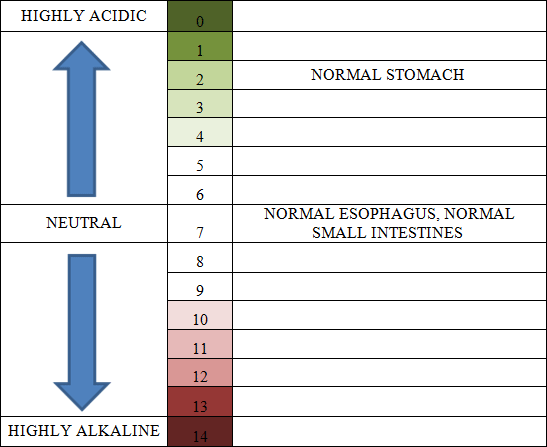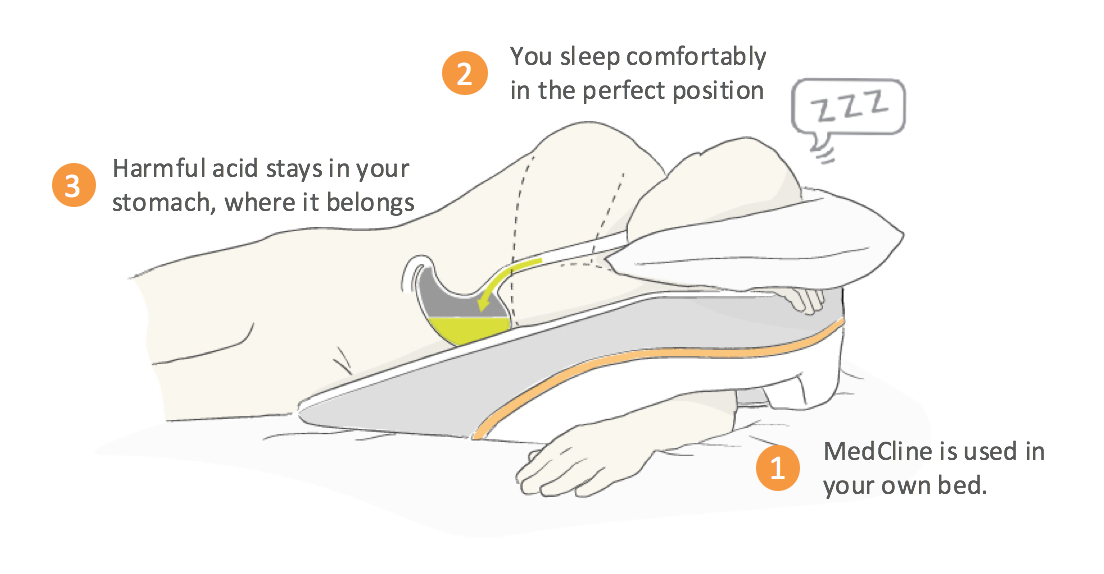How to cure heartburn you ask? Well, there’s no easy answer to that question.
If you’ve been struggling with acid reflux for any length of time, then you know there isn’t a quick fix to this disease as a whole. GERD has many symptoms, one of which is heartburn. At the crux of this disease is the lower oesophageal sphincter (LES). Located at the junction of the oesophagus and the stomach, the LES can weaken and no longer function as an effective barrier, allowing the acidic contents of the stomach to back-flow up into the oesophagus. When this happens, heartburn often follows. This weakening of the LES is progressive, so the more often you reflux, the more frequent the episodes become.
Learn more: GERD explained: The role of the LES
Medications can help relieve acid reflux symptoms by making the contents of the stomach less acidic; however, they don’t stop reflux from happening. That’s why managing GERD requires commitment and diligence: Watching what and how you eat and making lifestyle choices aimed at minimizing reflux can reduce your symptoms AND help stop the progression of the condition.
But sometimes, despite your best efforts to manage your GERD, heartburn strikes and you need relief (fast!). So though we can’t provide a definite answer to “how to cure heartburn?” We can offer four quick fixes to help you cool the burn.
Learn more: The progressive stages of GERD
Four quick fixes to cure heartburn
1. Change your position.
When you recline at night or stretch out on your favourite lounger, it is easier for the contents of the stomach to flow up into the oesophagus. When heartburn strikes, make gravity work in your favour. Try standing or sitting up straight to help clear the oesophagus of the acidic contents of the stomach more quickly – which will help the heartburn pass more quickly, too. We also encourage a few sips of alkaline water when you begin having those symptoms.
But standing up sleeping isn’t really an option. We think elevation therapy is one of the best options to avoid heartburn symptoms at night. There are two elements that can make a big difference in the severity and duration of your GERD symptoms.
First, raise the head of your bed by 7 inches, which allows any contents in the stomach to stay where they belong. Second, shift over and sleep on your left side. A portion of the stomach wraps under the left lung, and this move will cause any excess content in the stomach to settle into that area and away from the oesophagus. This is illustrated in an image provided by MedCline, as noted below. To learn more about our recommended options, we encourage you to visit our section on elevation therapy in “Get Symptom Relief Now!”
2. Chew gum.
Several studies have demonstrated that chewing gum can reduce heartburn symptoms. How? One theory is that chewing gum stimulates the production of saliva, which, when swallowed, helps neutralize stomach acid. Saliva is more alkaline than your body or stomach, and its thick, sticky nature coats the oesophagus, providing added protection.
If you’re feeling the burn, try chewing gum for 30 minutes to an hour to see if it helps relieve your acid reflux symptoms. Just be sure to stick with sugar-free gum to prevent tooth decay, and avoid mint-flavored gums, since mint is a common heartburn trigger.
3. Take a drink.
When you reflux, stomach acid makes its way up into the oesophagus, causing that telltale burn. Drinking a glass of water can flush the stomach acid from the esophagus and help relieve your symptoms.
Better yet, try alkaline water. Your stomach has a very low pH, something in the range of 1.5 to 3.5, which is very acidic as you can see from the graph below:

Drinking normal tap water with a pH of 7.0 to 7.3 will certainly reduce the acid in the stomach. However, alkaline water, with a pH of 9.5, is 100 times more alkaline than tap water, so it will do a much better and faster job of neutralizing your stomach acid!
4. Take an acid neutralizer.
When heartburn hits and you need relief, try an antacid like Tums, Rolaids, or Maalox. These medications act quickly to neutralize the acid in the stomach, which can reduce your symptoms. Don’t have any on hand? Dissolve a teaspoon of baking soda in eight ounces of water and drink to neutralize the acid in your stomach. Just use caution with this home remedy since it’s high in sodium and shouldn’t be used by people on a sodium-restricted diet.
Learn more: Treating GERD with medications: What you need to know
We also like H-2 blockers, also known as Histamine H2-receptor antagonists. These include such brand names a Pepcid, Pepcid AC, Tagamet, and Zantac. These medications don’t work as quickly as acid neutralizers, but they are still very fast. H2 blockers should be taken about 30 minutes before you eat or when you typically experience symptoms.
The benefit of H2 blockers is that they work longer than antacids, but they don’t have the same medical risks associated with proton pump inhibitors. As is true with all medications we highly recommend that you discuss use with your doctor before you begin any drug treatment, prescription or over-the-counter.
And remember that while these quick fixes may help relieve your GERD symptoms, they don’t address the underlying cause of those symptoms. Your goal should be to stop reflux from happening in the first place, which is why we recommend several long-term solutions to cure heartburn.
Long-term recommendations to cure heartburn
We all wish there was a “silver bullet” that we could all take to cure heartburn. Unfortunately, that simply does not exist. However, there are proven actions most adults can take to reduce or eliminate heartburn symptoms.
A. Maintain a healthy body weight
Do you know your body mass index (BMI)? If not, start now by entering your weight and height into a BMI calculator – CLICK HERE to use the NIH calculator and find your current BMI.
A healthy BMI is between 19 and 25, but anyone with a compromised LES should not be at the high end of normal. We recommend a BMI of 24 or less. Why is this important? We wrote a cornerstone article titled How is your excess weight destroying your LES (and driving your symptoms), which we highly recommend you read if you have a BMI greater than 24.
This excess weight does two things that will increase your GERD symptoms. First, it distends the stomach, pulling down on the LES and stretching it out. Over a long-term, this will reduce the effectiveness of the LES to act as an effective barrier between the stomach and the oesophagus.
Second, it puts added pressure on the diaphragm, potentially pushing stomach content into the esophagus. Many research studies have proven that a reduction in BMI will reduce GERD symptoms. In an NIH published paper researchers concluded the following:
“In summary, our findings suggest that, beyond being overweight or obese, the risk of GERD symptoms rises progressively with increasing BMI, even among normal weight individuals. This appears true for all degrees of symptom severity and duration, as well as for nocturnal symptoms. Notably, weight loss was associated with a decreased risk of symptoms.”
B. Adopt a GERD-friendly diet
All GERD experts recommend identifying your trigger foods and changing your diet to cure heartburn. It is easy to find your trigger foods, just begin logging what you eat and your GERD symptoms into a food diary. Within a few weeks, you will know what triggers your symptoms and what does not.
However, changing your diet is not so easy. That is why we wrote 5 steps to an effective GERD diet. We hope you will take a few moments and learn more about this very important topic. This is a very detailed discussion about all the diet-related factors that you should know to begin your new diet.
C. Make all the necessary lifestyle changes
There are many things you can do besides maintaining a healthy BMI and following a GERD friendly diet. Here is a short list of recommendations you should consider:
- Avoid alcohol
- If you smoke, stop immediately
- Leave at least 3 hours between your final meal and bedtime
- Wear loose-fitting clothes
- Drink plenty of water (total ounces = your body weight in pounds / 2)
- Walk for 20 minutes after a major meal to aid digestion
- Try eating 5 or 6 small meals daily
For a more thorough list of recommendations, we recommend you read Acid Reflux Remedies – Questions, Answers, Stages & Treatments.
What are you going to do to cure your heartburn?
Are you simply going to treat the heartburn with short-term remedies or are you going to attack the real underlying problem that is driving your symptoms? I suspect that the larger long-term recommendations are a bit intimidating and you are not sure if you can make that type of commitment. You are not alone.
Here is an approach that may help you ease into building your path to relief and good health:
- Take a longer-term view of your problem. Attack the symptoms with short-term solutions while designing a longer-term approach.
- Read up on each of the longer term recommendations of a healthy BMI, GERD-friendly diet, and lifestyle changes. Become an expert.
- Select one of those three long-term recommendations to work on first. You can’t make all those changes at the same time. We suggest you first make the lifestyle changes, then work on your BMI, and finally change our diet.
- Set a reasonable timeframe to make this program work for you.
- Work with a GERD expert, they will be a valuable partner as you design your plan.
We know you can do this because so many others before you have succeeded. Don’t delay, this is your disease and it’s your quality of life that is at risk. You can do this!
This article is from Reflux MD – https://www.refluxmd.com/how-to-cure-heartburn/?utm_source=RefluxMD+MASTER&utm_campaign=365118b9e7-AUTOMATION_Masterlist_Automation_64&utm_medium=email&utm_term=0_589b0d1b5f-365118b9e7-79093457
Medical Resources Used for This Article
- How to Get Rid of Heartburn, by Elea Carey and Heather Cruickshank and reviewed by Debra Rose Wilson
Ph.D., MSN, RN, IBCLC, AHN-BC, CHT, Healthline, https://www.healthline.com/health/gerd/heartburn-relief - Association Between Body Mass Index and Gastroesophageal Reflux Symptoms in Both Normal Weight and Overweight Women, by Brian C. Jacobson, MD, MPH, Samuel C. Somers, MD, et al, National Institute of Health, https://www.ncbi.nlm.nih.gov/pmc/articles/PMC2782772/
- H2 Blockers, by Dr.ColinTidy MD and reviewed by Dr. John Cox MD, Patient, https://patient.info/health/indigestion-medication/h2-blockers



